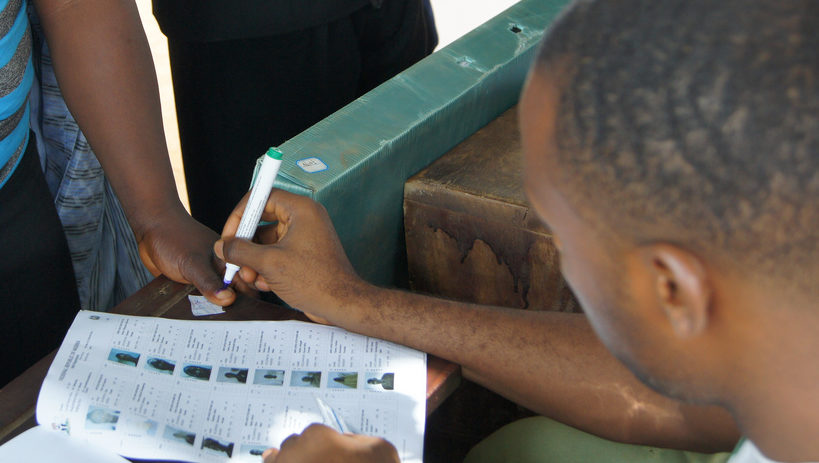“Let’s do our duty as citizens and youths “
July 10 Young people have both the power and the responsibility to influence the political direction of their country writes Laila Johnson-Salami, 21, a Correspondent from Ibadan in Nigeria, who suggests five steps young Nigerians should take to use this power.
Young people have both the power and the responsibility to influence the political direction of their country writes Laila Johnson-Salami, 21, a Correspondent from Ibadan in Nigeria, who suggests five steps young Nigerians should take to use this power.
Did you know, that out of Nigeria’s 198 million citizens, over 100 million are aged thirty and under? One of Europe’s greatest thinkers, Erasmus, once said that “the main hope of a nation lies in the proper education of its youth” and although civic engagement is not enforced in Nigeria’s schools, it is still our duty as citizens and youths to enforce civic engagement upon ourselves. But, civic engagement is more than just voting during the elections, there are several steps that we must take as Nigeria’s most powerful age bracket to ensure a progressive change.
Get Your Permanent Voter’s Card (PVC)
There are two steps involved in obtaining a Permanent Voter’s Card – registering and collecting. Two weeks ago on radio, a caller expressed his difficulties in obtaining his PVC. It took him ten hours to register for his PVC and although it was a pressing experience, he outlined the importance of willpower. Certain systems are set up against you, but the only way to change a system is through engagement.
The more people persevere despite the difficult process of obtaining a PVC, the greater the collective effort towards a more smooth sailing Nigeria. The importance of voting will always overshadow the difficulties of the process.
Register with a political party
There are 68 political parties registered in Nigeria, not two. Ask yourself which party represents your personal views, which party understands sustainability and which party you believe can enact the necessary change at the forefront of the polity.
Many citizens have expressed their reservations about registering with political parties in Nigeria, because of the high cost associated with membership, but that is because we’ve been closing our minds to the number of parties in the country and focusing on the two elephants in the room – the APC and the PDP. Some parties don’t even ask for any financial commitment to register with them. It is our job as young people to carry out that research and decide on the party that is most suitable for us. By becoming members of political parties young people can play a role in the decision-making and conversation that can change Nigeria.
Read the candidates’ manifestos and ask questions
When it comes to elections in Nigeria, it is often the norm for politicians to sway votes their way through rice and money bags. This is as a result of lack of development which has made poverty the voice of the average Nigerian citizen and a threat to democracy. Citizens are so hungry, that rice for the next month, is a solid reason to support a candidate. The repercussions of this are right in front of us.
Furthermore, the absence of political education at the secondary school level (which many citizens do not exceed) has led to a limited knowledge of voting.
We are not employed by our government, but our government is employed by us – imagine someone coming to an interview for a job at your workplace and they hand you a bag of rice to convince you to employ them, would that be enough? No? I thought so, and that is the same mindset that we should apply to voting.
Use your voice as a tool for change
I always emphasize that silence is violence, especially when we have the opportunity to use our voices as a tool for change. Earlier on this year, we heard about the Sweepers Protest in Edo State, which led to the firing of the Commissioner for Environment and the retiring of the General Manager of the Edo State Waste Management Board.
We live in an age of technology and therefore we have unlimited tools at our fingertips such as social media, that we can use to put pressure on the government and get the change we have been yearning for. Demand your rights, demand the rights of those who cannot voice their concerns themselves and be constantly active in our political processes – this cannot be overemphasized.
Volunteer to serve at the grassroots level
This is probably the most important factor in civic engagement because, without volunteering, you’re not fulfilling your role as a citizen at the grassroots level. Once you get to the top floor in your chosen career, always send the elevator back down for others to rise.
There are several ways to volunteer including coaching local teams or joining an NGO. One way to find a cause which you can support and give your time to is by looking at the United Nations Sustainable Development Goals. Ask yourself which goal motivates you to work towards change in our world and research projects around you focused on that particular goal so that you can play your role as a global citizen.
These are five steps that you can take towards civic engagement, but they are certainly not all the steps. Civic engagement has several elements and you can never be “too” civically engaged. The highest office in Nigeria is not the Office of the President but the Office of the Citizen and therefore, our role in revamping Nigeria’s politics for the socio-economic benefit of the country cannot be overemphasized.
Reach me on Twitter:@ljsonline
Photo credit: The Commonwealth’s Assetbank
………………………………………………………………………………………………………………………………………………………………………
About me: I am a journalist, reporting on TV and radio as an anchor for Wazobia Max and Nigeria Info FM. I am also the founder of the We Rise Initiative, a non-governmental organisation empowering woman and girls to rise above 21st century oppression, and a member of the 67 Million Initiative – Nigeria’s most active youth organisation.
………………………………………………………………………………………………………………………………………………………………
Opinions expressed in this article are those of the author and do not necessarily represent the views of the Commonwealth Youth Programme. Articles are published in a spirit of dialogue, respect and understanding. If you disagree, why not submit a response?
To learn more about becoming a Commonwealth Correspondent please visit: http://www.yourcommonwealth.org/submit-articles/commonwealthcorrespondents/
…………………………………………………………………………………………………………………………………………………






